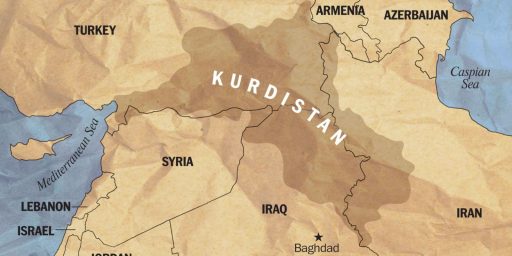Iraq Study Group Wants Diplomacy with Iran and Syria
The Iraq Study Group, headed by James Baker, will recommend overtures to Iran and Syria in an effort to solve the crisis.
A draft report on strategies for Iraq, which will be debated here by a bipartisan commission beginning Monday, urges an aggressive regional diplomatic initiative that includes direct talks with Iran and Syria but sets no timetables for a military withdrawal, according to officials who have seen all or parts of the document.
While the diplomatic strategy appears likely to be accepted, with some amendments, by the 10-member Iraq Study Group, members of the commission and outsiders involved in its work said they expected a potentially divisive debate about timetables for beginning an American withdrawal.
In interviews, several officials said announcing a major withdrawal was the only way to persuade the government of Iraq’s prime minister, Nuri Kamal al-Maliki, to focus on creating an effective Iraqi military force. Several commission members, including some Democrats, are discussing proposals that call for a declaration that within a specified period of time, perhaps as short as a year, a significant number of American troops should be withdrawn, regardless of whether the Iraqi government’s forces are declared ready to defend the country.
Among the ideas are embedding far more American training teams into Iraqi military units in a last-ditch improvement effort. While numbers are still approximate, phased withdrawal of combat troops over the next year would leave 70,000 to 80,000 American troops in the country, compared with about 150,000 now.
Considering that these are the same two countries that are backing Hezbollah and that Iran, especially, has to like the way things are headed in Iraq, it is far from clear why they would be interested in helping the U.S. salvage its policy.
The “build your military or we’ll withdraw” option is also a head scratcher. One presumes Maliki already has every incentive in the world to establish effective, loyal security forces. The insurgents are targeting his countrymen, after all, not to mention his cabinet.
Kevin Drum, Jim Henley, Matt Yglesias, and Steven Taylor are all skeptical about this Report as well, for a variety of good reasons. Taylor reminds us that “these types of panels rarely do produce groundbreaking results,” a topic about which I’ve written a longer piece for publication elsewhere.





and that Iran, especially, has to like the way things are headed in Iraq
Up to a point. A failed terror-breeding state next door, however, isn’t attractive; and Iran already has one to its east.
it is far from clear why they would be interested in helping the U.S. salvage its policy
Well, that’s why we negotiate with people, to make such things clear to them. If the U.S. can’t find some carrot to offer countries like Iran and Syria, then we should quit claiming to be a superpower.
Or, said another way, if we had some ham we could make a ham and cheese sandwich if we had some cheese.
And then what, talk to North Korea too? It’s amazing how all these experts want to get our enemies in a room and try to talk them to death. Nobody seems to learn from history.
Nobody seems to learn from history.
Ironic Comment of the Day.
Anderson hit the nail on the head: The USA will have to stop claiming to be a superpower if it can’t find some “carrot” to offer Iran and Syria. Indeed, if there is anything the Bush administration’s debacle in Iraq has shown, it is that being a superpower is about a lot more than being able to invade and overthrow governments of already-failed and isolated states more or less at will. Being a superpower also implies having carrots and being in a strong and respected diplomatic position.
Here, the USA is no superpower. What can the US government offer Syria, for example? The Golan Heights? Not ours to give back, and we can’t make Israel give it back. A bigger role in Lebanon? Its proxy there, Hezbollah, is now so emboldened that it is ready to force elections–yes, elections!–that it expects would greatly enhance its power?
And, aside from dropping the effort to get Iran to give up its nuclear ambitions, I don’t see what the US administration can offer Iran as a “carrot.”
There is not a lot to offer either of these countries, because the Bush administration has squandered its own supposedly super-power. They are both stronger now than it is. Bush wanted to remake the Middle East. Mission accomplished!